EDITORIAL: The bag police
If left unchecked, politicians would allow America’s Nanny State to grow to immeasurable proportions. Government bureaucrats and elected officials believe they know better than we mere mortals when it comes to making personal choices about health care, child rearing, diet, smoking and countless other subjects.
The environment is another favorite vehicle for proponents of the Nanny State. Straws, styrofoam and coffee pods have all been recently targeted by green groups. Some jurisdictions have banned plastic shopping bags. And if New Jersey legislators have their way, paper grocery bags would be outlawed, as well.
As Christian Britschgi of Reason explains, New Jersey Gov. Phil Murphy, a Democrat, vetoed a bill last August that would have added a five-cent tax on both paper and plastic carryout bags. He did so, not out of aversion to the proposal itself, but because it didn’t go far enough to punish those who would dare use bags to transport groceries and other items.
“Single-use carryout bags — particularly plastic bags — represent a significant source of the litter that clutters our communities and mars New Jersey’s beautiful shoreline and parks,” he wrote in his veto statement. “Instituting a five-cent fee on single-use bags that only applies to certain retailers does not go far enough.”
State legislators agreed and created new proposals that would not only ban plastic grocery bags, but all single-use bags — both paper and plastic. Straws would be banned, too.
But as Mr. Britschgi explains, a recent study of similar plastic-bag bans in California found that, while overall plastic-bag consumption was reduced, the sale of smaller garbage bags spiked by 120 percent. Because many people no longer had leftover plastic shopping bags with which to line their garbage cans or clean up after their pets, they simply bought additional, larger garbage bags not covered by the ban.
In addition, Mr. Britschgi notes, stores could simply choose to offer thicker plastic bags, which would increase overall plastic production and consumption. And those reusable cotton tote bag alternatives? Turns out they’re far worse for the environment when factors such as emissions and the energy needed to create them are considered.
The New Jersey bill could actually encourage littering, Mr. Britschgi points out, as purchases would no longer come with a “ready receptacle” to collect wrappers, cups, lids, containers and other miscellaneous paper — items that a state survey found are already more likely than bags to be thrown out of a car window or dropped onto the sidewalk.
Like many Nanny State endeavors, the New Jersey bag ban is well-intentioned overkill that is unlikely to accomplish its stated objective and will create a host of unintended consequences. For that reason, New Jersey legislators should throw this bill in the proper receptacle — lined with paper or plastic.

















